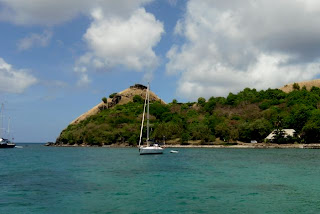 |
| Pylades, left foreground, Fort-de-France in the back |
On St. Lucia, we spent a few days at
the lovely new marina, drawn by the opiate luxury of 110v electricity to power
our air conditioner, the convenience of stepping off the boat onto a dock, and
the aromas and sounds of the ten or so bars and restaurants on the marina
grounds. But, after giving the boat a
thorough cleaning and the hulls a well-needed wax, and after attending to some
medical and logistical items ashore, we knew it was time to leave. We motored across Rodney Bay, and dropped the
hook just off Pigeon Island, which, owing the creation of a causeway from the
spoils of the marina dredging, is no longer an island. No matter; it’s a lovely place, and while the
anchorage is crowded, we spent some lovely time with some cruisers who spend every
winter on the boat in the clear blue waters and skies of St. Lucia.
 |
| Frigate bird, gliding above |
In the anchorage, surrounded by
American and French boats, and the blaring beat of reggae-rap-disco music
coming from the resorts and bars that line the sandy beaches of Rodney Bay, we
were reminded of the enduring charm of these islands. Overhead, a massive frigate bird circled, its
forked tail guiding its flight as it scanned the water below for bits of fish
to scavenge. We had last seen these somewhat ominous birds in the Galapagos, by
the thousands, the red throats of the males bulging outward in their mating
displays. Their continued equatorial presence is reassuring somehow, letting us
know that nature retains a sense of dominion over these islands and waters.
 |
| Gregory, driving his flagship of provisions |
Meanwhile, making the rounds of the
anchorage in a rickety wooden boat, its engine belching black smoke, Gregory
the Flag Man offered up fruits, breads, and vegetables to the cruising
community. Even though he promised that
the mangoes were picked in his grandmother’s backyard, our new cruising friends
burst the romantic bubble by assuring us they’d seen Gregory in the local
supermarket every morning. No matter; he
recalled for us the small boats in the Marquesas that offered us pamplemousse and bananas, rowing to our
recently-arrived boat from their little island, an island with neither grocery
store nor marina. Here, in the
Caribbean, amid frigate birds, tourist development and crowded anchorages, we
see what might someday become of the more remote islands of the Pacific and
Indonesia …
 |
| Small beachside resort at Grande Anse D'Arlet |
After our long passages, our new
sailing distances have also taken a bit of getting used to; we pulled up our
anchor in Rodney Bay at around 8 am, and by noon or so, we were settling into a
small bay midway up the adjoining island of Martinique, in a small village
called Grande Anse D’Arlet. Clearing in
was a snap. Unlike Barbados, which required us to tie our boat alongside a
rickety pier, pay US$50, and fill out innumerable forms, the French
laissez-faire attitude seems right for these languorous islands. We dinghied ashore, went up to a dedicated
computer terminal in the little restaurant, filled in a form electronically,
hit “send,” and then printed off our clearance.
No fees, no muss, no fuss.
Finding an ATM to get some Euros was
another thing, however, and the nearest source of cash was a very long walk
away … so we went for a swim, ate on board, spent the night, and then moseyed
around the point to here, where we are nestled against the looming walls of the
actual “Fort”-de France. Unlike St.
Lucia, which has been independent of England since 1979, Martinique revels in
its colonial status, or, perhaps more accurately, in the accompanying Paris-borne
subsidies. The city – for we’re talking
a few highways, a few high-rises, and a distinct urban feel – sounds, smells,
looks, tastes, and feels like a bit of transplanted France. Less influenced by any local or indigenous
culture than, say Tahiti, the island of Martinique seem like a perpetually
sunny France, populated by people whose family trees include healthy mixes of
transplanted Gauls, slave-shipped Africans, and, over the last 100 years or so,
the melting pot of Caribbean cultures. Despite
their cosmopolitan genetics, however, locals remain true to their Frenchness. No
one in Martinique speaks – or at least admits to speaking – English. Qu'avez-vous dit?
 |
| Pigeon "Island," St. Lucia |
Just after we pulled into
Fort-de-France, we were delighted to see our good friends Fergus and Kay, on Pylades, anchor just alongside; we met
them first in Bora Bora, and then our paths have crossed repeatedly as we each
made our way around the world – Indonesia, Cocos, Mauritius, South Africa,
where we spent New Year’s Eve together at the Royal Cape Yacht Club, and now
here. They head back home to Galway, Ireland
in a month or so, having completed their circumnavigation on a steel boat they
built by hand, learning how to cut and weld steel, to work the wood for the
interior, and to assemble the mechanical and electrical systems needed to steer
a boat safely around our globe. What an
accomplishment, to sail a boat you built yourself around the world! We’ve become very good friends with them, and
will miss them as they sail east toward home.
Congratulations, Fergus and Kay, and
we hope to see you again!
Next
stop: Dominica.






No comments:
Post a Comment